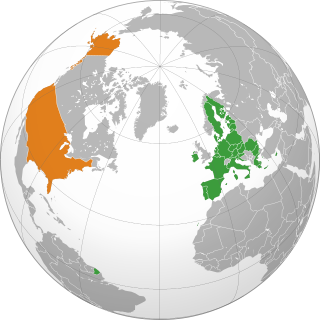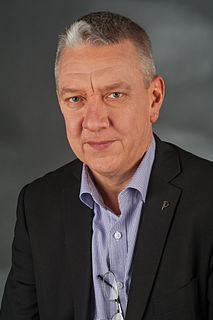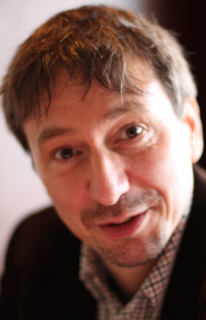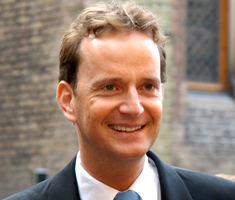Related Research Articles
An open standard is a standard that is publicly available and has various rights to use associated with it, and may also have various properties of how it was designed. There is no single definition and interpretations vary with usage.

Charles Barry McCreevy is a former Irish Fianna Fáil politician who served as European Commissioner for Internal Market and Services from 2004 to 2010, Minister for Finance from 1997 to 2004, Minister for Tourism and Trade from 1993 to 1994 and Minister for Social Welfare from 1992 to 1993. He served as a Teachta Dála (TD) for the Kildare constituency from 1977 to 2004.
EuroLinux is a campaigning organisation that promotes open source software / free software in Europe, and that are opposed to the European Union's proposals to introduce laws on software patents. It is also known as EuroLinux Alliance. It is not the umbrella organisation for Linux User Groups in Europe.
The Proposal for a Directive of the European Parliament and of the Council on the patentability of computer-implemented inventions, procedure number 2002/0047 (COD) was a proposal for a European Union (EU) directive aimed to harmonise national patent laws and practices concerning the granting of patents for computer-implemented inventions, provided they meet certain criteria.

The Free Software Foundation Europe (FSFE) was founded in 2001 to support all aspects of the free software movement in Europe. FSFE is a charitable registered association under German law, and has registered 'chapters' in several European countries. It is an official European sister organization of the US-based Free Software Foundation (FSF). FSF and FSFE are financially and legally separate entities.
Hartmut Pilch is a German software developer, translator, and digital rights activist who founded the Foundation for a Free Information Infrastructure or FFII. Since 2015 Pilch supported the local Pegida movement in Munich and spoke at several Pegida rallies.

The European Union (EU) directive on criminal measures aimed at ensuring the enforcement of intellectual property rights (2005/0127/COD) was a proposal from the European Commission for a directive aimed "to supplement Directive 2004/48/EC of 29 April 2004 on the enforcement of intellectual property rights ". The directive was proposed on July 12, 2005 by the Commission of the European Communities.

The Federation Against Software Theft (FAST) is a not-for-profit organisation, formed in 1984 with the aim of eliminating copyright infringement of software in the UK. FAST was the world's first Anti-piracy organisation to work on protecting the copyrights of software publishers. Initially concentrating on lobbying parliament to revise Copyright law, FAST also prosecutes organisations and individuals for copyright infringement on behalf of its members and publicises the legal penalties and security risks.
The Association of Independent Professionals and the Self-Employed (IPSE) is a British not-for-profit organisation. It was established in 1999 as the Professional Contractors Group, a protest group against the IR35 tax statute. Later, it expanded its responsibilities to cover the wider interests of freelance consultants and contractors as a representative body for freelancing in the UK. It is a company limited by guarantee, owned and run by its members. In September 2014 the PCG changed its name to IPSE, and increased its constituency to the entirety of Britain's 4.3 million freelance and self-employed workers. IPSE represents members in numerous sectors, including IT, engineering, interim management, media, project management, healthcare, oil and gas extraction and marketing.
Florian Müller is an app developer http://www.fosspatents.com/ and an intellectual property activist. He consulted for Microsoft and writes the FOSSPatents blog about patent and copyright issues. From 1985 to 1998, he was a computer magazine writer and consultant for companies, helping with collaborations between software companies. In 2004 he founded the NoSoftwarePatents campaign and in 2007 he provided some consultancy in relation to football policy.
The Irish Free Software Organisation is a member organisation based in the Republic of Ireland which works to promote the use of free software in Ireland, and oppose legal or political developments which would interfere with the use or development of Free Software.

European Digital Rights (EDRi) is an international advocacy group headquartered in Brussels, Belgium. EDRi was founded in June 2002 in Berlin by ten NGOs from seven countries. In March 2015, the European Council adopted a proposal that may compromise net neutrality, a major concern of EDRi.

The Transatlantic Economic Council (TEC) is a body set up between the United States and European Union to direct economic cooperation between the two economies.

OpenForum Europe (OFE) is a European open source software and open standard not-for-profit organisation advocating for interoperability in technology. Its key objective is to contribute to achieve an open and competitive Digital ecosystem in Europe.

Lars Christian Engström is a Swedish computer programmer, activist and politician. He is deputy chairman of the Swedish Pirate Party. Engström was elected a Member of the European Parliament (MEP) in the 2009 election.
Friends of the Earth Europe (FoEE) is the European branch of the world's largest grassroots environmental network, Friends of the Earth International (FOEI). It includes 33 national organizations and thousands of local groups.

Erik Hjalmar Josefsson is a Swedish musician, campaigner against software patents, and internet activist.

Dutch Sandwich is a base erosion and profit shifting ("BEPS") corporate tax tool, used mostly by U.S. multinationals to avoid incurring EU withholding taxes on untaxed profits as they were being moved to non-EU tax havens. These untaxed profits could have originated from within the EU, or from outside the EU, but in most cases were routed to major EU corporate-focused tax havens, such as Ireland and Luxembourg, by the use of other BEPS tools. The Dutch Sandwich was often used with Irish BEPS tools such as the Double Irish, the Single Malt and the Capital Allowances for Intangible Assets ("CAIA") tools. In 2010, Ireland changed its tax-code to enable Irish BEPS tools to avoid such withholding taxes without needing a Dutch Sandwich.

Campaigning in the United Kingdom European Union membership referendum began unofficially on 20 February 2016 when Prime Minister David Cameron formally announced under the terms of the European Union Referendum Act 2015 that a referendum would be held on the issue of the United Kingdom's membership of the European Union. The official campaign period for the 2016 referendum ran from 15 April 2016 until the day of the poll on 23 June 2016.